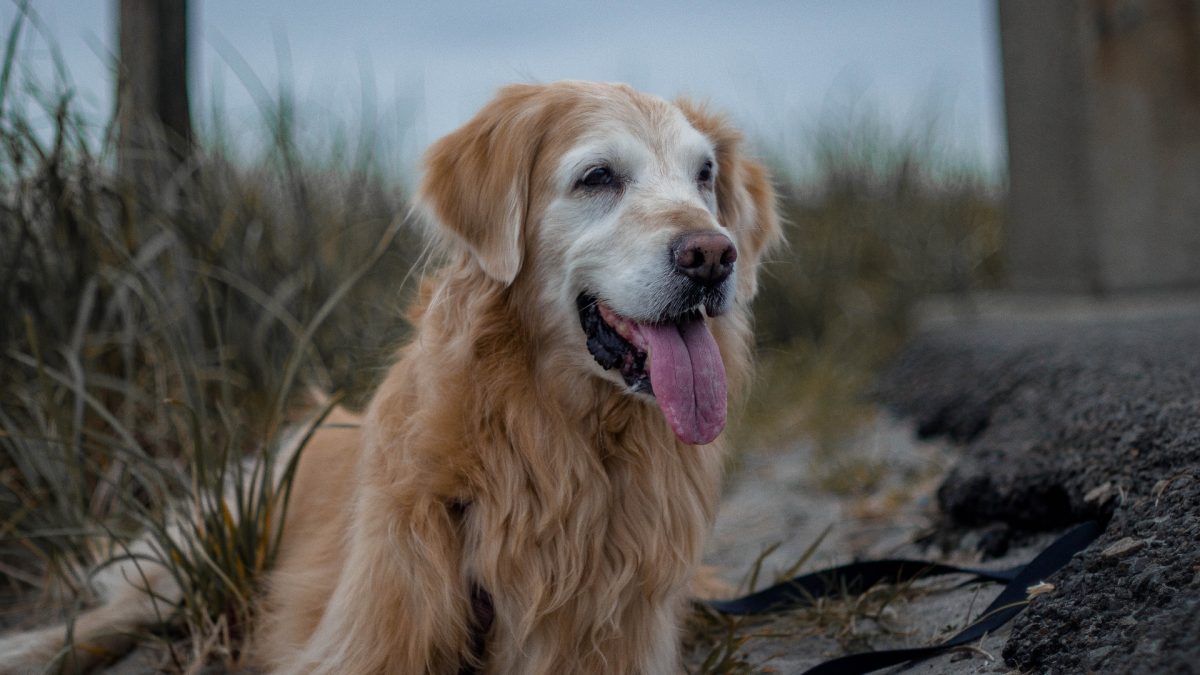The Golden Retriever is one of the most docile dog breeds in the world. Their eager-to-please personalities are one of the many attributes that keep them in the #3 spot of America’s most popular dog breeds. With that being said, training them isn’t a cakewalk, and it takes work to cultivate that obedience and personality they’re known for.
If you’ve just bought a Golden Retriever puppy or if you’re considering that very purchase, you probably want to know how much work is going to go into training them.
History of Golden Retrievers
The Golden Retriever originated in Scotland at the end of the 19th century. The breed’s lineage dates back to many different hunting breeds that primarily retrieved waterfowl. These origin breeds (the now extinct Tweed Spaniel being the most important) were often dignified, reserved, and aloof.
They were great companions in the field, but not as affable and warm at home. Thus a breeder set out to combine the homely canine and the hunting utility into one, and what resulted was the Golden Retriever breed.
This is important as the ‘hunt’ remains present in this breed. This means that despite the perfect family dog reputation of a Golden Retriever, their lust for stimulation and their work-oriented demeanors are innate to them. It’s important to know the lineage of any dog if you’re going to train them, and the Golden Retriever—despite their popularity—is no exception to this rule.
Golden Retriever Personality Traits
While Golden Retriever’s don’t have a high prey-drive because they’re hypersensitive to sensory input and stimulation as a whole, they can often be extremely excitable. Owners rave that their Goldens remain a puppy well into adulthood because that enthusiasm never wanes, and sometimes it’s one of their most coveted characteristics.
Other times not so much, as this excitably can become problematic when it seemingly has no end. The first time this is usually encountered is when training a puppy to comfortably walk on a leash. It usually takes a bit longer than usual to leash-train a Golden Retriever.
Lastly, when it comes to dogs as popular as the Golden Retriever, it’s incredibly important to thoroughly research the breeder you’re purchasing your puppy from. The more demand for a breed, the larger the chance irresponsible breeders and puppy mills stress more importance on quantity than quality. If your dog is a product of irresponsible breeding, no amount of training is going to change their propensity to demonstrate poor characteristics.
With that being said, these are simply things to be aware of in the training process, and not points to dissuade you from purchasing a Golden Retriever. There’s a reason they’re America’s #3 dog, and that’s because by in large they’re fantastic companions, lovable home bodies, and have astounding temperaments.
To the contrary of these warnings, Golden Retrievers are known for their extreme docility and easy house-breaking. So long as you take the proper measures beforehand, you shouldn’t have any problems training your Golden Retriever.
Start Training Early 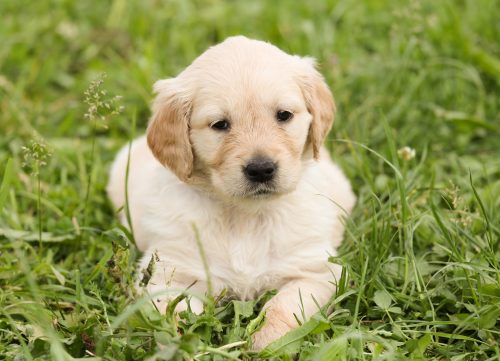
So you now you have your Golden Retriever puppy (which should be somewhere between 6-8 weeks of age), and he has been brought into your home.
The first thing to know is there is no grace period in training a Golden, and as soon as your pup steps foot into your life is as soon as the training should begin.
This breed is known for their high intelligence, and you’ll find with persistence that they learn quickly. .
These tips pertain specifically towards what you can do as the owner, but it’s highly recommended that you take your Golden Retriever to puppy classes as well.
Create A Routine
The Golden Retriever strives off of routine, particularly when they feel that they have a job to do. This goes back to their working-class heritage. Begin by setting a meal routine and showing your Golden Retriever where they should eat.
It’s best to create structure right from the get-go, meaning there are set times when they’re going to eat and a set place to do it. By instating this semblance of structure, you’re already creating a foundation for your puppy.
Potty Training Is Key
Potty training is usually the first obedience lesson your dog will learn, and it needs to be treated with care. Most likely you’ll have to do some extensive on research on the best ways to potty train your Golden Retriever, but first you should know that it’s very hard for a puppy to hold their bladder for long amounts of time.
When they need to go, they need to go. You can start this housetraining process by—when you see that they’re about to have an accident—grabbing them and placing them in the correct area for potty. If this is the yard, then try and take them back to the same exact spot every time.
Once they’re finished use positive reinforcement to reward them for their good behavior, and always keep a gentle and reassuring tone, as they’re sensitive to the sound of their owner’s voice. A note here too, is that crate training can be beneficial when it comes to potty training your dog.
Lastly, this is a fantastic place to work on your patience as an owner. A Golden Retriever puppy can be a handful. They’re incredibly excitable, enthusiastic, and smart enough to navigate themselves into trouble.
Know that the road becomes easier, but in the initial phase of your puppy’s life you need to be supportive, diligent, and stick strictly to positive reinforcement. For this breed, positive reinforcement is also the proper reward system to instate in their adult years.
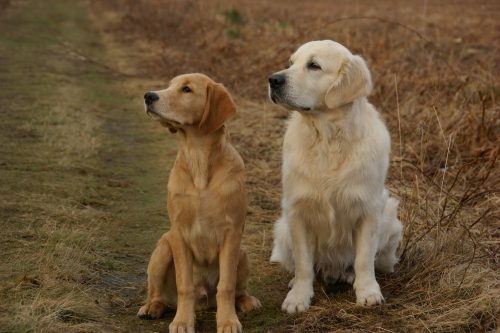 Early Socialization
Early Socialization
As soon as your puppy has had a couple of days at home, it’s time to start exposing them to the world.
The earlier he engages with other people, canines, and environments, the higher the chance that he is going to be comfortable in his skin, and confident in different places.
Do this by taking your pup on short walks, introducing him to the dogs at the local dog park, and taking him with you on whatever daily errands need doing.
This will expose your dog to sounds, smells, strangers, and life as it’s going to be. Many dog specialists stress great importance on the first four months of a canine’s life, and express that during this time dogs need to be socialized as much as possible.
But to this point, the Golden Retriever is one of the breeds that adores socialization. They’re naturally social, welcoming, and love to be stimulated by all new things. Take your puppy out and watch his eyes burst with excitement as the world unfolds around him.
Preventing Puppy Biting
It’s just one of those things that some breeds do more than others. Golden Retrievers love to nibble and bite if given the opportunity. Whenever your pup starts to do this, make sure you put a toy in his mouth (or something appropriate to bite on) and then reward him for his good behavior.
If he bites on your fingers, play with his mouth, but if he bites too hard a good tip is to give an overzealous ‘yelp’ and pull your hand back. Your Golden needs to know when he’s biting too hard, and you need to make that obvious—especially to a cute naïve little puppy. By using these tips, you can train your puppy not to bite and help him form good habits for the future.
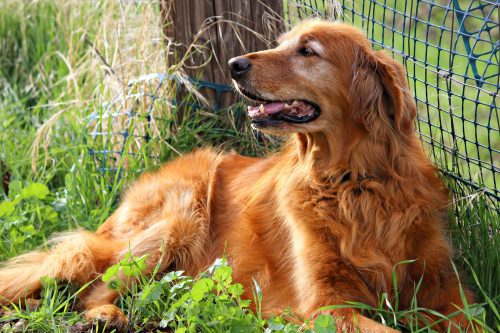 Obedience Classes
Obedience Classes
The aforementioned period of the Golden Retrievers training process is not one to teach them complex commands or stimulate the full capacity of their intelligence, but it’s to harness their confidence, earn their trust, and expose them to the world.
You’re not going to have an easy job training your Golden Retriever if they first don’t trust you, and if they’re timid of their environment.
Now that you’ve done your part and set them on the path for a well-behaved adolescence, it’s the time for puppy classes. Yes, you can absolutely train your Golden at home, but for a dog of this size and intelligence, it’s highly recommended that you send them to obedience classes.
Why? Because the trainers are professionals, and the Golden Retriever’s ability to retain knowledge allows them to easily integrate their lessons at home. Not only will they help socialize your canine with other dogs, but they’ll teach your dog the basic commands you want him to learn. Your Golden Retriever should know to sit, lie down, stay, quiet down, ask for permission, follow, and come when told.
Puppy classes also open up time that you’d otherwise have to spend meticulously teaching your Golden Retriever the entire range of commands. If you don’t have extra time, then puppy classes are the obvious choice. Regardless, if you’re set on training your Golden Retriever all on your own, then you need to do two things:
Assess Your Desired Outcome
Before you begin training, you need to know exactly how trained you want your Golden Retriever to be. Depending on whether or not you want your dog to know a few commands and to be obedient, or if you want him to be a hunting utility and utilize that fantastic nose, then your initial steps are going to be different.
Do Your Research
Now that you know exactly what sort of training you intend to administer, it’s time to research the best ways of instating it. If your dog is going to assist you on hunts, then you’re in for a lot more work and an entirely different training program. On the other hand, if it’s simpler than that, there are various successful training programs out there that’ll help you during the process.
Always Use Positive Reinforcement 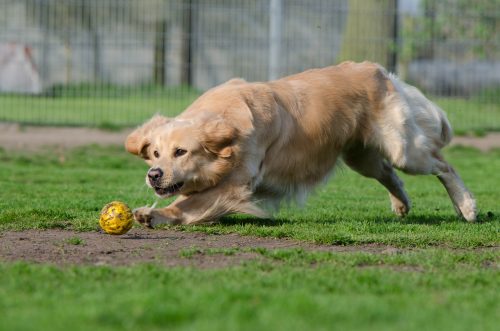
As a rule of thumb, with Golden Retrievers, you should always use a positive reward system.
Golden’s are not an alpha-breed that needs a firm hand to keep them in place, nor are they a pack dog that naturally seeks out a leader. Instead, they’re a loving and sensitive canine prone to respond poorly to scolding.
They’re smart enough to understand the point, so always reward them for their good behavior, rather than scolding them for their bad.
Research the best positive reward systems used for Golden Retrievers, know that they involve lots of treats, praise, toys, and playtime.
Always remember this breed is extremely docile. It’s not a chore for them to learn, and if you make it fun for them you’ll have their attention for longer periods of time.
Utilize Their Puppy Years
The Golden Retriever is a highly trainable breed. It’s important that you utilize their puppy years to prepare them for a well-behaved adulthood, as this combination will evoke the best personality possible from your pup.
Take your dog to puppy classes! They’re a breed that loves to learn, and professionals will teach them obedience, commands, and then show you how to incorporate the lessons at home.
If you choose to do it yourself, identify what you want from the process, and do your research. Know that Golden Retrievers can be a bit more fickle in their adolescent years and often require more work to keep them on track. But if you follow these tips, it should not prove difficult.
All said and done, the Golden Retriever has earned its reputation for a reason. They’re fantastic dogs and blossom in their training. Don’t be surprised to discover just how quickly your Golden learns what you’re teaching him, and how hard you fall in love with the little pup.

